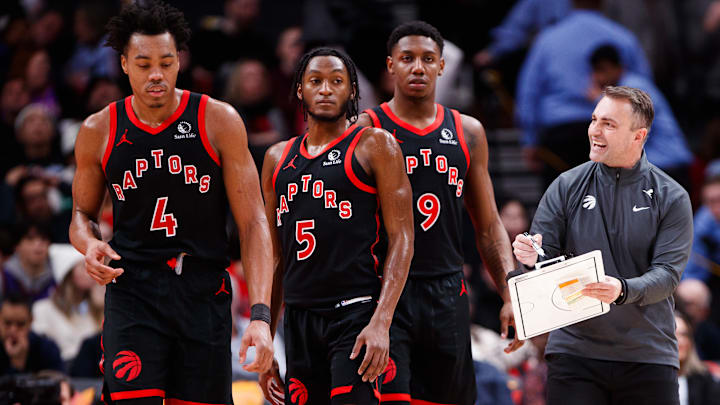"Is there some way we can blame the metric system?"
That's John Hollinger's quip as he begins to discuss the Toronto Raptors as one of the teams who dropped the ball in free agency this summer. The Athletic's senior NBA writer and former Memphis Grizzlies VP underwent the task of identifying what signings from this summer were not being discussed enough. After tackling the underrated positive moves, he wrote about bad moves that went under the radar.
Not content simply to discuss a single move, however, he first noted a long stretch of questionable decision-making dating back to the 2019 title, and culminating in a questionable signing this summer. The Raptors only signed two players to new, guaranteed deals this summer (if you don't count draft picks): Garrett Temple to a minimum deal, and Immanuel Quickley to a five-year contract.
John Hollinger thinks Immanuel Quickley was overpaid
It's Quickley's contract, of course, that Hollinger takes issue with. The newly-acquired point guard signed a five-year, $162.5 million contract that could pay him as much as $175 if he meets certain benchmarks. For Quickley, who has never even sniffed an All-Star roster and was a backup for his entire tenure in New York, it was certainly a significant payday.
Hollinger takes umbrage with the amount first of all, as Quickley will make nearly the full max for a player with his experience in the first year of the deal. From there it stays flat, while a true max would increase each season, but it’s certainly a lot of money. Hollinger cites James Harden as making essentially the same amount of money this season.
What seems to bother him more, and what we noted in the immediate aftermath of the deal as well, is that Toronto seemed to be bidding against itself. What team was going to offer Quickley a massive contract, tying up their cap space well into free agency? The Utah Jazz were the only viable option, but the two sides were never once linked to one another in reporting.
Quickley was a restricted free agent, which means the Raptors could match any deal he signed. That should have given them leverage to sign Quickley to a more team-favorable deal. Instead, they essentially handed him just about as much as they could, and certainly more than he has earned thus far.
Was Hollinger’s criticism fair, then?
